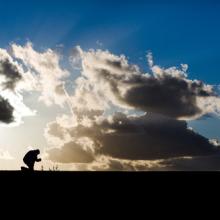Health
I CAN’T WRITE a completely unbiased, academic review of this book: Nora Gallagher is a friend, and I know the medical world that she must still navigate, and how wonderful it is when you arrive at the Mayo Clinic. This book is for anyone who plans to die one day and wants to live daily with purpose and with a real God. Those who are or have been physically ill will find a kindred soul in Gallagher, while the healthy will wonder how they will handle the sad, sympathetic gazes from others in the pew when their names are placed on the prayer list.
When she is 60, the vision in one of Gallagher’s eyes begins to fail. She limits the use of her one good eye for fear of losing sight in it too. Not so bad, you might think—except that as a writer, seeing is key to paying for the medical tests and travel she will endure for two years.
Of course all good patients become writers in a way. At first you take random notes in scattered notepads. Finally you redefine yourself as a full-time patient whose life demands documentation of every symptom and test in a little black book that becomes your constant companion. You have now entered what Gallagher calls Oz, the land of illness.
For Gallagher, Oz is strange. Oz is blurry. She is lonely. She is a patient not a person. Oz has many disrespectful, condescending doctors working in machine-like hospital systems that allow 10 minutes for a consult; they must get to the next patient, not solve the mystery of her now-painful, debilitating state.
IN FRANCE, about 70 percent of water services are privatized. French corporations continue to vie for control of the global water supply. But in 2010, Paris, in a case of “remunicipalization,” exited contracts with Paris-based Veolia and Suez Environnement, the world’s two largest water service companies.
Veolia is also the largest waste-water corporation in the world. Subsidiary Veolia Water North America is the largest private operator of U.S. municipal water and waste-water systems and controls the water service of about 14 million people.
The city of Jakarta, Indonesia, was recently confronted with a clean-water crisis as supplies run dry and a leaky system loses about 40 percent of its water. The city, with 10.9 million people, decided to buy back control of its water system in June from Suez Environnement.
I am not shy about using the saltshaker, and neither I nor anyone else in my family has any sort of problem with blood pressure. That’s because we mostly don’t eat things that come out of packages or from fast-food places (where someone else takes them out of packages), and the salt that is a problem in the North American diet doesn’t come from the saltshaker but from the extreme levels of sodium in packaged foods.
But you will never hear Michelle Obama say that.
There was a similar unutterability to everything having to do with AIDS back in the day. Even when scientists had a fairly clear understanding of the nature of the threat and how it was spread, most “official” speech tended toward a hedging: “we don’t know what causes it; we don’t want to say what’s causing it …” Even today people don’t get tested because they don’t want to know, even though getting tested obviously doesn’t give you the virus — it merely points out that it is there. It seems to point to so much more, though.
As a nutrition student in college, I paid attention to the food we would eat on campus and became keenly aware of how much plastic and material was used and disposed of because of the way our food was packaged. It upset me to see so much packaging thrown in the trash every day. I raised concerns with the Dining Services committee and became a staunch advocate for a better recycling program on campus.
That was my first foray into understanding the relationship between the food system and environmental concerns and their consequent impact on health – something that became a much larger part of my life upon graduation, when I read the book The Omnivore’s Dilemma by Michael Pollan and joined a network of dietitians focused on Hunger & Environmental Nutrition.
The more I read and learned, the more I came to understand the sobering facts about the impacts that our industrial food system has on our society. Power in agriculture has become more and more concentrated over the past several decades, leading to many “monocrops” – large swaths of land devoted to growing only one type of crop rather than a diversity of crops that keeps fields vibrant and healthy. We’ve seen unprecedented extinction of species as a result. Artificial fertilizers lead to soil runoff, nitrous oxide emissions, and pesticides polluting our waterways.
This is a very personal column. In December of last year, I was diagnosed with prostate cancer. There were no symptoms or problems, just some results from a routine blood test that needed to be checked out. I remember being on a conference call when I saw the doctor was phoning with the results of a biopsy, but continued on with the other call assuming I could return it later to hear that there were no problems. There were problems, he told me, and I would need to see a surgeon.
Surprise was not the right word — not even shock. The news felt incredulous to me. I was about to launch a new book tour early in 2013 and everything seemed to be in control. And Sojourners was involved in intense advocacy work around immigration reform, gun violence, and the budget/sequester battles. There had to be a mistake, or surely some convenient treatment that would suffice. Certainly, I would work this all out privately, and stay on schedule for everything else. But then the conversations started, as did meetings, further testing, time-consuming activities, discussions of medical options — and a deepening anxiety began to grow over the next several weeks.
The book tour for On God’s Side, both U.S. and U.K., had to be postponed and reset without saying why. I kept the health news and discussions in a small and close circle of family, friends, and senior staff. And I did my best to go on as if this wasn’t happening. But it was.
If you eat food, here are two newish books you should know about.
You may already have met Robert H. Lustig, author of Fat Chance: Beating the Odds Against Sugar, Processed Food, Obesity, and Disease (2012). Lustig is the UCSF professor whose surprisingly riveting 90-minute lecture, "Sugar: The Bitter Truth," has already had nearly 3.5 million hits on YouTube. The thesis of his lecture: it's not dietary fat that's making Americans gain weight, it's sugar. And sugar is doing much worse things than increasing our clothing size. It's setting us up for a whole range of lethal diseases that are almost entirely avoidable.
...
In Salt Sugar Fat: How the Food Giants Hooked Us (2013), Moss, a Pulitzer Prize-winning investigative reporter, tells what the food industry has been up to during the last couple of decades. Food executives, Moss says, are nervous: people are figuring out that convenience foods aren't good for them.
The first Christmas after my daughter was born, I got a two-year membership to 24 Hour Fitness as a gift. Included in the membership was one personal training session.
My trainer bristled with annoyance at my “fad diet” when I told him we were going Paleo for three months. Then he showed me to the elliptical machine and told me that he lost weight by drinking sugar-free Kool-Aid all day and ordering off of the light menu at Taco Bell.
Obviously, our philosophies weren’t in line. But I was still able to get some cardio, weights, and an occasional spin class in at the gym. No hard feelings. But staying motivated and committed to working out while staying home with a toddler has been hard.
That might be because I haven’t tried CrossFit.
I think CrossFit is like secular church. It offers more than weight loss or fitness. It speaks to our innate desires for community, purpose, and transformation.
This morning, Madu walked the one kilometer path from his village to my house. He is married to Sirima and they have two children: four-year-old Sira, who they call Bonnie, and two-year-old Musa, who they call Papa. He told me that Papa had burned his hand and wrist in the morning cooking fire.
Maybe the path to civility and peace can be found somewhere along the path from my house to Madu’s village.
“Do you have any medicine for a burn?” he asked.
There is a hospital in our small town on the southwestern edge of Mali, but its small staff of doctors serve a large population of people without the use of technology, electricity, or even running water. Many times people come to me for help and healing before they go to the hospital because I have free first aid supplies, a generator, and a deep water well. I consulted my ragged copy of Where There Is No Doctor and turned to the section on the treatment of burns.
“Another world is not only possible, she is on her way. On a quiet day, I can hear her breathing.”
~ Arundhati Roy
Vegetables.
Who could have imagined an economy in which gentle vegetables were subversive?
But this is our world. A world where a vegetable, whose growth is imperceptible to the naked eye, can spider a crack into the concrete of our industrial food system.
We find ourselves in a food economy that sickens us. Health is divided along race and class lines: the food economy particularly sickens those whose wages do not allow them to buy the foods that can cure us of the diseases industrial “foods” cause.
Corporations, which do not speak the language of human love and health, wrangle to profit from the stream of ill Americans falling from the industrial foods conveyor belt. But we know that type 2 diabetes, heart disease, obesity, and some cancers are fully preventable by replacing part of what we eat with fruits and vegetables.
Why, in a wealthy, fertile country are we wrecking the environment to produce foods that kill us?
Most members of the clergy are taught to put the physical and spiritual needs of others first, but that self-denial may be harmful to their own health, according to a new Duke University study.
Studies of United Methodist pastors in North Carolina found high rates of chronic disease and depression, and researchers worry it can be difficult to convince clergy to seek help.
To address these unique problems, Duke Divinity School's Clergy Health Initiative developed a program to provide preventative care in a spiritual context.
It’s profoundly disheartening to see people in political leadership and positions of cultural influence whose understanding of women’s anatomy—and that it is possessed by human beings, not mythical prototype “whores,” “virgins,” or “martyr mothers”—hasn’t progressed much past pre-adolescent hooting at drawings on the boys’ room walls.
Don’t get me wrong—I’m not actually looking for excuses to chat about vaginas or hormones with strangers or friends. I’m fairly comfortable with prudish reserve in daily life, especially when the alternative is coarse humor that’s usually not very funny. Then again, if you watch TV sitcoms or contemporary comedy films, hearing the word “vagina” outside of a gynecologist’s office isn’t the surprise it once was. As Ann Hornaday noted in her March 13 essay in The Washington Post, the word is now so prevalent, “it’s hard to believe that, just six years ago, Grey’s Anatomy producer Shonda Rhimes made ABC standards and practices executives so nervous about the word that she substituted the far more playful ‘va-jay-jay.’”
By contrast, when Eve Ensler’s “Vagina Monologues” debuted in 1996 it was controversial theater for a number of reasons, the most obvious being the first word in the title. The play was groundbreaking in its forthright exploration of women’s experiences—the brutal, the ecstatic, the ambivalent—in relation to women’s distinctive anatomy. It helped many women reclaim the language for their own bodies in the public sphere, rather than being limited to euphemisms and crudities deployed by others. The play opened up more space to talk about sexual abuse and violence against women, a step in weakening the shame that is part of any abuser’s arsenal.
Pundits and politicians who opine about the so-called war on women ought to take note of the lawsuits filed Monday against the Department of Health and Human Services contraception mandate by 43 religious groups, including several Catholic dioceses and colleges.
The suits object to the requirement that religious institutions provide their employees with insurance coverage for contraception, sterilization and abortion-inducing drugs.
In the propaganda surrounding the mandate, HHS seems to suggest that women’s only stake in the matter is “free” contraception. This is a shallow – and frankly demeaning – view of women, who, equally with men, have an important stake in the preservation of religious freedom in the United States.
I can’t lift my arms.
They scream in muscle soreness after 3 weeks of CrossFit workouts. At the age 43 I’ve found myself in poor physical condition; my career having taken over my usually fit body. But a block behind our house in a slightly ghetto strip of businesses along a sidewalk dotted with empty gin bottles and crushed packs of generic cigarettes is a little white building with red trim. Inside this vintage garage which 2 years ago was where most of the neighborhood dope slinging happened, is now a CrossFit gym.
When walking my dog I’d pass by the crazy people lifting weights and stepping up and down on giant tractor tires and pulling themselves up over steel bars and I thought I surely was not in good enough shape to show up.
But three weeks ago I did just that. I hauled my out of shape middle-aged ass over to the gym and have worked out four days a week for the last three weeks.
Now I can’t lift my arms.
I was talking to my husband about why I am loving CrossFit and it made me realize that it is for some of the reasons I love church.

"Yoga." Image by Earl McGehee via Wylio http://bit.ly/xzjw0R.
As a yoga practitioner — no, make that "zealous convert and obsessed fanatic" — I listened with great interest to Terry Gross's Fresh Air interview this week with William Broad, whose book The Science of Yoga has just been released.
In the interview and in the book, Broad (a science writer for the New York Times and a yoga practitioner for more than 40 years) takes on some of the claims about yoga and separates the wheat from the chaff, arguing that only some of these claims are borne out by science. Here are three myths debunked, and two major claims — that yoga can do wonders for your sex life and your mood — officially verified.
Megachurch pastor Rick Warren has become an outsized evangelical superstar: best-selling author of The Purpose Driven Life series, pastoral mentor and even political referee.
Now Warren is finding a new purpose: tackling his outsized waistline.
Warren, 58, says the revelation came about a year ago, during a marathon baptism session of about 800 people at Saddleback Church.
As he struggled to submerge members of his flock in the baptismal pool one by one, he realized his parishioners were heavy and that he, too, was fat, setting a terrible example.
Warren says his gradual weight gain — about two to three pounds a year — has added up over his 30 years as a pastor. To lose the extra pounds and inspire others to do the same, the former football player enlisted the help of three doctors.

Abuse at Afghan Prisons. How Catholic Conservatives could turn the GOP presidential race. OpEd: Jesus would not #OccupyWallStreet. OWS is "largely secular." Religious leaders see immigration as "God's Call." OpEd: Alabama new immigration law has unintended consequences. OpEd: Wall Street Worship. Could 2012 be the most ideological election in years? And much more.
What would it be like to eat on a budget of $4.50 a day, the average daily allotment for the 45 million Americans who use food stamps? This week, the Sojourners interns are joining other faithful folk nationwide in finding out!
Visit msnbc.com for breaking news, world news, and news about the economy
Where is the compassion in our economy and our politics? It says much of the economic system that Sojourners even needs to campaign for a "moral budget." How do we, as Christians, challenge structures that allow billions of dollars to be wasted via tax loopholes while 1 in 6 Americans live in poverty?
Will we, as Sachs hopes,
A truck bomb has killed at least 70 people in the Somali capital of Mogadishu, including a crowd of young students applying for scholarships to study abroad.











